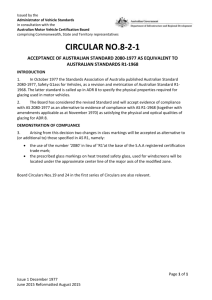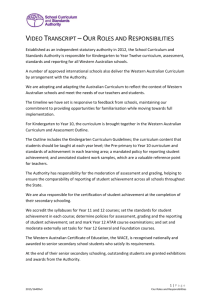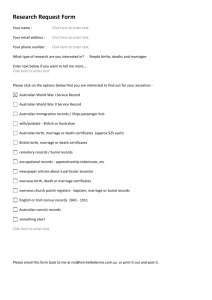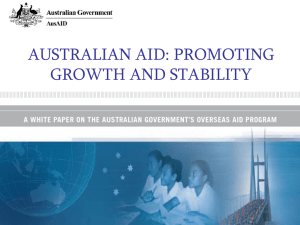Obstetrics and Gynaecology - Australian Volunteers International
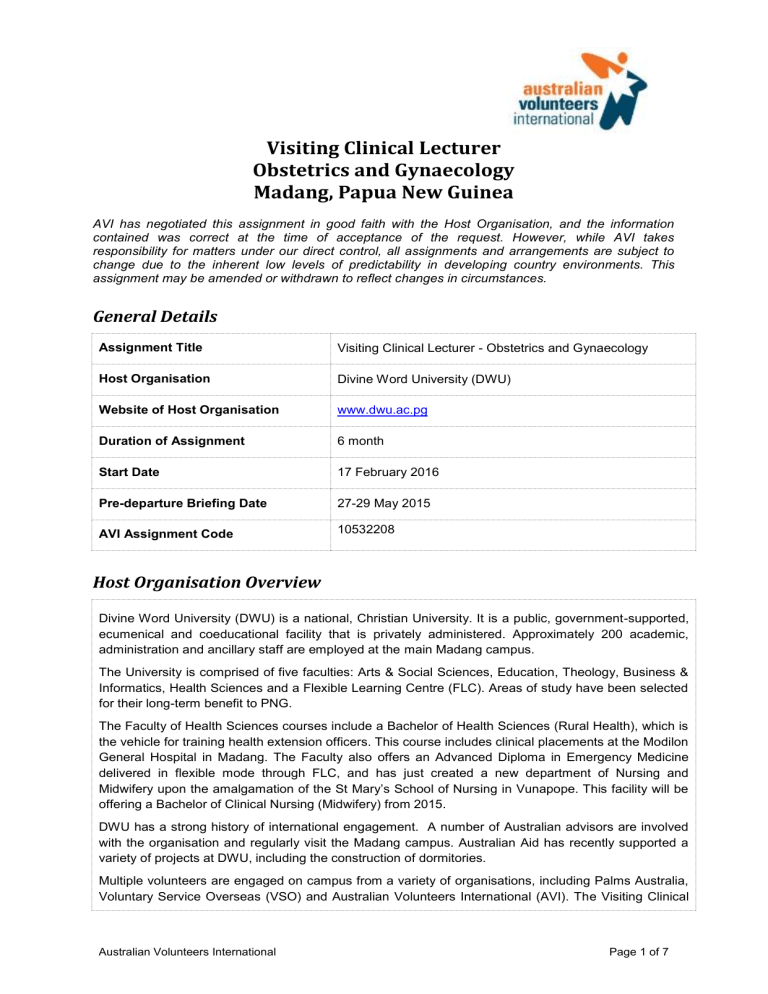
Visiting Clinical Lecturer
Obstetrics and Gynaecology
Madang, Papua New Guinea
AVI has negotiated this assignment in good faith with the Host Organisation, and the information contained was correct at the time of acceptance of the request. However, while AVI takes responsibility for matters under our direct control, all assignments and arrangements are subject to change due to the inherent low levels of predictability in developing country environments. This assignment may be amended or withdrawn to reflect changes in circumstances.
General Details
Assignment Title
Host Organisation
Website of Host Organisation
Duration of Assignment
Start Date
Pre-departure Briefing Date
AVI Assignment Code
Visiting Clinical Lecturer - Obstetrics and Gynaecology
Divine Word University (DWU) www.dwu.ac.pg
6 month
17 February 2016
27-29 May 2015
10532208
Host Organisation Overview
Divine Word University (DWU) is a national, Christian University. It is a public, government-supported, ecumenical and coeducational facility that is privately administered. Approximately 200 academic, administration and ancillary staff are employed at the main Madang campus.
The University is comprised of five faculties: Arts & Social Sciences, Education, Theology, Business &
Informatics, Health Sciences and a Flexible Learning Centre (FLC). Areas of study have been selected for their long-term benefit to PNG.
The Faculty of Health Sciences courses include a Bachelor of Health Sciences (Rural Health), which is the vehicle for training health extension officers. This course includes clinical placements at the Modilon
General Hospital in Madang. The Faculty also offers an Advanced Diploma in Emergency Medicine delivered in flexible mode through FLC, and has just created a new department of Nursing and
Midwifery upon the amalgamation of the St Mary’s School of Nursing in Vunapope. This facility will be offering a Bachelor of Clinical Nursing (Midwifery) from 2015.
DWU has a strong history of international engagement. A number of Australian advisors are involved with the organisation and regularly visit the Madang campus. Australian Aid has recently supported a variety of projects at DWU, including the construction of dormitories.
Multiple volunteers are engaged on campus from a variety of organisations, including Palms Australia,
Voluntary Service Overseas (VSO) and Australian Volunteers International (AVI). The Visiting Clinical
Australian Volunteers International Page 1 of 7
Lecturer (VCL) in Obstetrics & Gynaecology would work alongside the Visiting Clinical Lecturer in
Emergency Medicine, another AVI Australian Volunteers for International Development position.
Assignment Overview
PNG’s health status ranks among the worst in the Pacific. One of the major contributing factors is a deficiency of well-trained health workers, especially outside of Port Moresby.
The Bachelor of Health Sciences (Rural Health) at DWU aims to address this deficiency by producing health extension officers (HEOs) equipped to practice in rural and remote areas. It is a four-year undergraduate degree that includes two pre-clinical years at the DWU Madang campus, and two clinical years in selected hospitals and health centres. There are approximately 60 students per year.
DWU offers the course under a National Department of Health directive to increase clinically competent health worker coverage for the rural areas of PNG.
HEO students spend their fourth year undertaking a series of seven-week clinical rotations at the
Modilon General Hospital (MGH) in Madang. This involves participation in clinical activities as well as a range of tutorials delivered on site. MGH is a 270-bed provincial hospital, providing specialist services in dentistry, ophthalmology (via the Fred Hollows Foundation), emergency medicine, paediatrics, surgery, medicine, and obstetrics and gynaecology (O&G). There are approximately 3000 deliveries per year with a caesarean section rate of 5%.
Clinical teaching and supervision of the HEO students would ideally be provided by a senior medical officer (SMO), however there is only one SMO for each discipline at MGH. These doctors are consumed with the service provision requirements of their jobs and have minimal time to teach students. Similarly, the clinical tutor (a university appointed HEO) in obstetrics and gynaecology has several other duties and is often not available for hospital-based clinical teaching.
Neither the university nor hospital has the capacity to employ extra clinicians with primarily teaching responsibilities. However, DWU aspires to train rural health officers, operating at a high level and therefore requires skilled doctors in all disciplines to provide expert teaching and training.
The Visiting Clinical Lecturer (VCL) in Obstetrics & Gynaecology will assist the SMO and clinical tutor to provide high quality clinical supervision of the HEO students. This will include bedside teaching and the delivery of a series of tutorials in the hospital classroom.
The VCL will also assist DWU by providing lectures to second year (and possibly even the first year) students based at the Madang campus. The exact content will depend on the academic timetable, but may include clinical examination and theoretical aspects of obstetrics and gynaecology.
Assignment Objectives
• Delivery of high quality and evidence-based teaching of health sciences topics and clinical skills
(principally obstetric and gynaecology focussed) to HEO students.
•
Improved capacity of Modilon General Hospital staff to deliver clinical teaching and training as well as clinical obstetric and gynaecological care.
Australian Volunteers International Page 2 of 7
Duties and Responsibilities of the Volunteer
In consultation with their line manager and relevant stakeholders, volunteers complete a work plan in the first three months of their assignment. The duties below are an indication of the type of work that may be involved in meeting the Assignment Objectives:
• Clinical teaching and training of fourth-year HEO students at the Modilon General Hospital, including structured tutorials, bedside clinical teaching and supervision
• Teaching of second-year HEO students, through structured lectures and tutorials, based on the campus of DWU
• Other teaching and training of rural health (HEO) students as required and requested by the Head of Department and Dean of the Faculty of Health Sciences
• Provision and supervision of clinical O&G care at Modilon General Hospital
• Professional and peer support of O&G trainees at Modilon General Hospital, including assistance with exam preparation, research support and clinical skills
•
Professional and peer support for DWU academic and teaching staff, including technical assistance, research collaboration and knowledge updates
Assignment Information
Line Manager
Head of Department - Rural Health, Faculty of Health Sciences, DWU.
Senior Medical Officer - Obstetrics and Gynaecology Dept, Modilon General Hospital.
Staff supervision
No line management responsibility for any staff.
Alongside their responsibilities to HEO students, the VCL will work alongside other doctors working in the obstetrics and gynaecology department at Modilon Hospital and supervise junior doctors, qualified
HEOs, midwives and midwifery students.
The VCL will work as a peer with PNG doctors training in O&G at Modilon Hospital. They will provide advice and contribute to supervision of junior doctors, HEOs, midwives and midwifery students. In addition, the VCL will work with nurses and other hospital and department staff as colleagues.
At DWU, the VCL will work with the clinical tutor to coordinate teaching and assessment duties, as well as the clinical tutors in other disciplines as needed. The VCL will take direction from the Head of
Department and Dean of the Faculty of Health Sciences.
Hours & Days of employment
From 8 am to 4.30 pm, Monday to Friday
The expectation is that the volunteer will work the equivalent of a 5 day week to a maximum of 40 hours per week.
Leave entitlements
Same conditions and terms as local colleagues apply, including national holidays. However, as a
Australian Volunteers International Page 3 of 7
minimum, volunteers will accrue 1 week of leave for each 3 months of work.
Other Conditions
There will not be a requirement for out of hours work.
Language skill and level required
The language of instruction will be English, however, acquiring an understanding of Tok Pisin will make it easier to work with the students and patients in the hospital environment.
Language support
An introduction to Tok Pisin will be included as part of in-country orientation at commencement of assignment, and further language training can be reimbursed by AVI.
Living as a Volunteer
Madang is situated in Madang Province. It is a pretty coastal town with a population of roughly 30,000 people. It has a hot and humid climate and a wet and ‘not-so-wet’ season. While it is coastal, unfortunately, the town beaches are not sandy, instead rocky - although swimming and snorkelling are possible at some areas. The surrounding island beaches are sandy and are easily accessed.
There are hills not too far from Madang township which give a lovely view across the surrounding area; however you may need a 4WD and a security clearance to access lookout points.
Due to the location, the climate, the coral and the islands nearby, Madang has been a magnet for tourism – both local and international. There are a number of good resorts and accommodation options in, and just outside of, town. A number of international organisations are also based in Madang, such as VSO.
While PNG has a fair share of law and order problems, Madang, and PNG on the whole, is largely a
Christian society, and there are many different churches, including Lutheran, Seventh Day Adventist,
Catholic, Uniting church, Evangelicals and Pentecostal.
PNG has been independent since 1975. It is a country with over 800 languages (Tok Ples) and a population of around 7 million. The country is represented by 22 provinces with the National Capital
District housing the capital of Port Moresby. PNG was under Australian administration since 1914 and briefly under the Japanese during the second world war.
It is a Melanesian society where the ‘Wantok system’ is the foundation of many of the diverse cultures that exist in the country. It is a very culturally and environmentally rich country, which offers adventures for the avid traveller, although these must be undertaken in accordance with the strict safety and security protocols endorsed by AVI.
PNG may be blessed with an abundance of natural resources however the current status of the economy and living standards as a whole do not reflect the enormous wealth and income that has been generated thus far.
Elections are held every 5 years, with the last election being held in 2012.
PMVs (public motor vehicles) are safe to use in Madang, and provide relatively reliable travel during daylight hours (although always use caution) and can transport you from the town centre (market and supermarkets) out to the surrounding areas and cost roughly K1 per journey each way – depending on
Australian Volunteers International Page 4 of 7
how far out of town you wish to travel. The town PMVs do not run after sunset.
Depending where you live, walking is always an option during daylight hours. However the weather may sway you against this. It is probably a good idea to be seen out walking with local colleagues initially, to reduce your risk of theft or attack. Despite Madang being relatively safe, walking is not advisable after 6pm (sunset), nor is it a good idea to be too predictable in your walking habits.
There is also a limited Ark taxi service that runs in the day and early evening. Bicycles can be purchase from many stores in town.
Mobile phone and internet services using a dongle are reasonably good and reliable throughout
Madang, although there are pockets where the reception is less good. You can buy mobile and internet credit at stores, top-up on line or at street vendors. Costs are affordable, (around K100 per month if you make a weekly 10 minute call to Australia, text message at other times and use the internet just to check e-mail and the news) but it depends on your usage levels. If you want to send/receive big attachments or downloads or video Skype home every day, be prepared to pay and be frustrated with the relative slowness of the connection compared with Australia.
In Madang you can also tap into the Divine Word University internet connection, which is the fastest in the country (but still manages to be slow-ish when all the students are on-line). You can buy DWU internet credit and use this with your laptop anywhere on campus.
There is a small gym at Madang Lodge, which is located close by the university and hospital.
Preparing your Application
Selection Criteria
Please begin by writing your responses to the following three questions, in a document headed -
Response to Selection Criteria: a. Why do I feel that volunteering overseas is the right thing for me to be doing at this time in my life?
(up to half a page) b. What are the b iggest personal adjustments I’m likely to have to make to be accepted as a useful colleague and engaged community member in this assignment? (up to half a page) c. How do I match the Essential Skills & Experience: Write a brief summary of your most relevant experiences, results and achievements responding to each criteria in the Essential Skills & Experience section of the Assignment Description.
To find out more details about preparing your application, please visit: http://www.australianvolunteers.com/volunteer/application-process/
To find out more details about the personal competencies required to be a volunteer, please visit: http://australianvolunteers.com/volunteer/have-you-got-what-it-takes/
Personal Circumstances Constraints
We are NOT able to accept applications from people with the following personal circumstances due to security, cultural, legal or visa restrictions in this location.
•
Applicants with accompanying children
Australian Volunteers International Page 5 of 7
Qualifications
• MBBS (or equivalent)
• At least one of the following: o Advanced Diploma of the Royal Australian and New Zealand College of Obstetricians and
Gynaecologists (DRANZCOG) o Registered vocational trainee with the Royal Australian and New Zealand College of
Obstetricians and Gynaecologists o Fellowship of the Royal Australian and New Zealand College of Obstetricians and
Gynaecologists (FRANZCOG)
Essential Skills & Experience
• Record of continuous professional development
• PGY 5 and above (ie, to have completed 4 years post-graduation)
• O&G experience in teaching and supervising junior staff or students. Able to perform clinical examination and operative procedures; teaching ward rounds; and clinical audit.
• Demonstrated success in building the skills of others through formal and/or informal training and coaching
•
Demonstrated success in consulting with stakeholders and facilitating the work of others to achieve an agreed outcome
Desirable Skills & Experience
• O&G experience in rural and remote environments
•
Work or travel within developing countries and resource-deplete environments
Allowances & Support
These allowance levels are based on the Cost of Living in country. They will be reviewed periodically and may increase or decrease. Volunteers will be given notice of any change to the allowance level.
Living Allowance
AUD 1300.00 per month
Accommodation Allowance
AUD 0.00 per month
Accommodation will be provided within the DWU campus.
•
•
•
•
•
•
•
•
•
Other Allowances & Support
All AVID Volunteers receive the following:
Pre-departure Briefing in Melbourne
In-country Orientation on arrival
Pre-departure vaccination expenses
Visa expenses
Pastoral care, assignment monitoring and security guidance
Return airfare to country of assignment
Psychological and medical advice and support services
Re-entry Support services
Settling in allowance (assignments longer than 6 months)
Australian Volunteers International Page 6 of 7
•
Re-settlement allowance (assignments longer than 6 months)
How to Apply
Should you wish to apply for this position please visit www.australianvolunteers.com
.
Select the assignment you are interested in and follow the prompts at the end of the page.
This assignment is part of the Australian Volunteers for International
Development program, an Australian Government initiative. www.australianaidvolunteers.gov.au/
Australian Volunteers International Page 7 of 7


